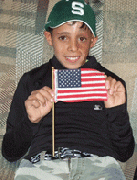The old military phrase “going beyond the call of duty” means different things to different people, and oftentimes, it isn’t rewarded with a medal or a ribbon.
 |
|
Twelve-year-old Mohammed was brought to Michigan from Iraq by a U.S. military officer for reconstructive surgery. He’s undergone four procedures and is in need of three more. |
While on standby for a potential suicide bomber attack near a government provincial center, Howell locked eyes with a young boy who was walking along with his mother.
Howell’s interpreter companion snapped a picture of the boy, including a second picture after the boy had removed his hat.
That night, Howell studied the second photo, his eyes transfixed on an image that had escaped him earlier in the day.
“Something about it bothered me,” Howell said.
It was revealed to Howell that the boy’s entire scalp and left side of his face were badly disfigured, and Howell made up his mind right then that something had to be done.
“I started thinking about tracking down this boy and his mom to find out what happened and to see if I could provide any assistance,” he said.

|
|
Mohammed had been severely burned over 30 percent of his body. |
That tribe member turned out to be a construction worker, and Howell paid him ten dollars to transport Mohammed and his mother to him on November 8.
Howell knew there was something unusual about the way the boy had looked at him two days earlier, because unlike other children, the boy, an 11-year-old resident of Ramadi named Mohammed, wasn’t the least bit afraid of him and his military standing.
When he and Howell first met, Howell was also surprised to find out that he spoke perfectly functional English.
Mohammed’s father had been a translator for the U.S. Marines in 2003-2004, but in 2005, he was killed by insurgents along with Mohammed’s uncle, plunging Mohammed’s mother into poverty.
His mother had been raising Mohammed and his five siblings on the equivalent of about $700 a month, derived mostly from begging from other women. The family slept on a dirt floor, and Mohammed’s conditions were worsening.
 |
|
Mohammed feels comfortable with his host family in the U.S. |
“The medical care could not be done in Iraq, and it was obvious he needed reconstructive surgery, so I began working on it,” Howell said.
A series of meetings over the next two months allowed Howell to gain the family’s trust, and gave him another idea. He convinced Mohammed’s mother to give him legal guardianship so he could bring him back to Michigan.
He got a passport and a release from Mohammed’s hospital and promised his mother that he’d bring him back to her when the surgery was finished, a trade-off that has given Mohammed new life in the land of opportunity.
Now, things are much simpler for Mohammed, who spends his days studying at the Greater Islamic School in East Lansing as a fifth grader.
He’s found a second home with a host Iraqi-American family, Ziena Saeed and her husband Ritha Naji, along with their two sons.
Saeed talked about the transition Mohammed has made to life in the States.
“I have two boys, and they’ve been like brothers the way they play and do things; he’s basically really comfortable living with us,” she said.
Mohammed, now 12 years old, also sees Howell and his two sons about twice a week, bonding with them over Detroit Tigers baseball and video games.
But while the three surgeries he’s received have improved his condition from a physical standpoint and a self-confidence standpoint, he knows there’s still a long way to go.
“He’s still a kid, but at times he feels nervous about the surgeries and doesn’t look forward to them. But he understands that’s the reason we brought him here,” Saeed said.
Mohammed still needs four other surgeries, which is a big part of the reason Howell started the Martyr Medical Fund. Established to provide humanitarian medical assistance to the children of Iraqi interpreters killed during the war, the fund is a non-profit organization that is currently focused on taking care of Mohammed’s surgeries so he can be returned home and live a normal life with the confidence and improved hearing and vision that will be provided by the reconstructive surgeries.
Howell and Saeed wanted to get the word out during Ramadan and stressed that donations can be made by visiting the Martyr Medical Fund’s Webs site at www.martyrmedicalfund.com
“The expenses are really mounting and I’m just trying to shine some light on his situation,” said Howell, adding that he’ll pay the expenses out of pocket if need be, while hoping that it doesn’t have to come to that and adding that the donations are tax deductible.
Saeed talked about the need for more assistance to bring closure to Mohammed’s situation so he can move on with his promising young life.
“We want to make the Arab American community aware of the situation and we would like to urge Arabs and Muslims to maybe get involved somehow because it’d be really be helpful for him,” she said.
“He has to go to the doctor every two weeks and it’s hard on him but we’re hoping that people will realize that we’re privileged to be living here in America and this is a great way to directly help a child by donating during the holy month of Ramadan.”






Leave a Reply